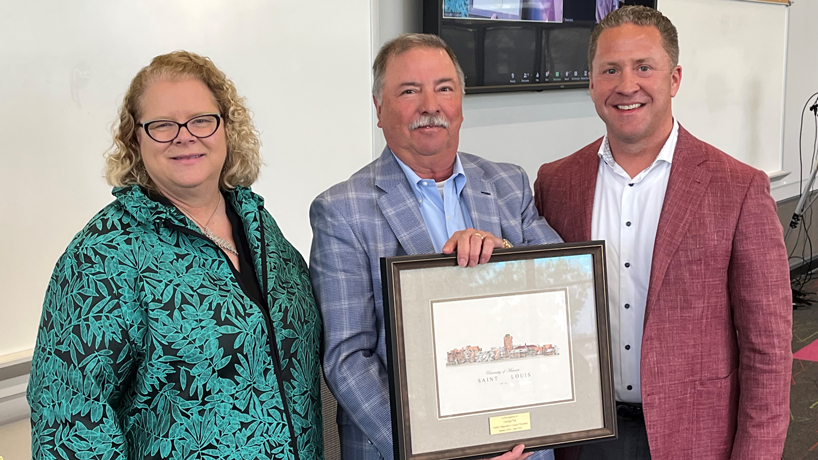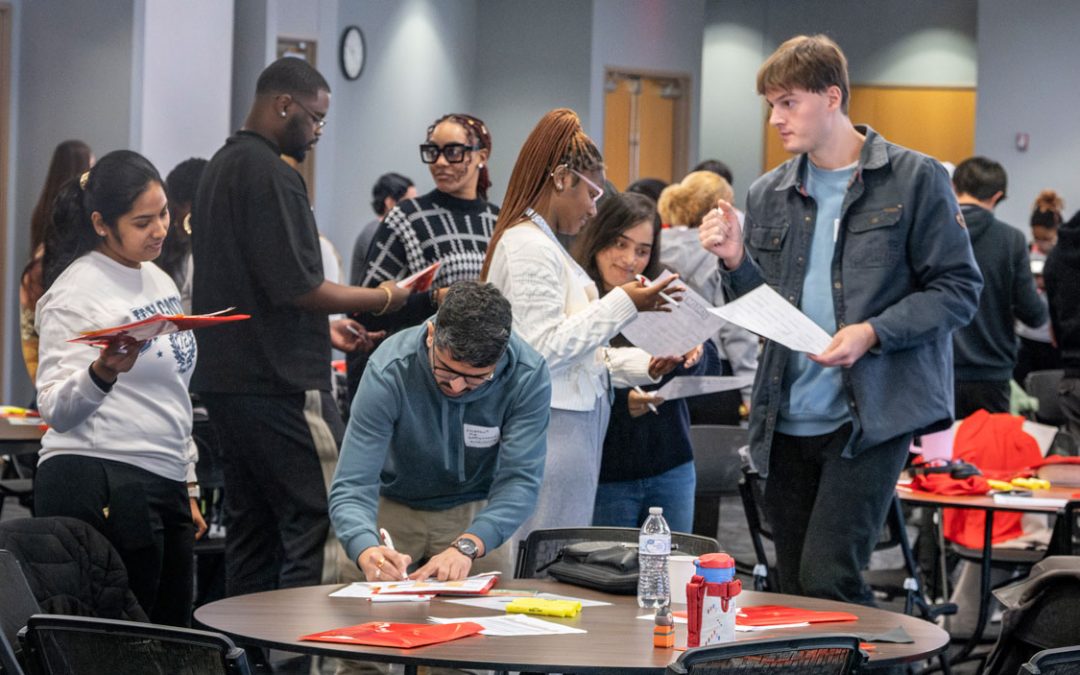
Incoming UMSL Chancellor’s Council President Ken Cella (at right), a principle at Edward Jones, joins Chancellor Kristin Sobolik (at left) in presenting a framed picture of the UMSL campus by a local artist to retiring Express Scripts Chairman George Paz during his final meeting in May. Cella presided over his first Chancellor’s Council meeting on Friday morning. (Photo by Jeremy Goldmeier)
Ken Cella had not been seeking the role of president of the Chancellor’s Council at University of Missouri–St. Louis, but he also couldn’t turn down the opportunity when Chancellor Kristin Sobolik asked.
Cella, the principal overseeing branch development at financial services firm Edward Jones, still takes tremendous pride in having graduated from the university with his bachelor’s degree in marketing in 1993.
“Attending the university really gave me such a solid foundation, in business and in life, that it put me on a path to create success beyond what I could have imagined,” said Cella, who began working for Edward Jones as an intern while still a student at UMSL in 1990 and has spent his entire career with the Fortune 500 company.
But it was more than loyalty to his alma mater that convinced him to take on the extra leadership responsibility.
“The reason I said yes, quite frankly, is because of Chancellor Sobolik’s leadership and the amazingly transformative time for the university,” said Cella, who replaced retired Express Scripts Chairman and CEO George Paz as president of the council and led the first meeting of his three-year term on Friday.
UMSL’s campus is beginning a physical transformation, bolstered by a $40 million appropriation by the Missouri Legislature of federal funding from the American Rescue Plan Act. As UMSL moves into its 60th year, the university is also aiming to take a more prominent role championing economic growth and equity in the St. Louis region.
In addition to his leadership role with UMSL, Cella supports the region’s primary civic and business leadership council, Greater St. Louis, Inc. He is currently a member of the board of directors, as well as chair of GSL’s ChamberSTL public policy initiative. Cella believes that the alignment of the business community, institutions and organizations both large and small – reflecting the diversity that exists across the region’s 15 counties in Missouri and Illinois – can help drive strategic investment and create a forward-looking economic vision for St. Louis. He also believes his alma mater has an important role to play in bringing that vision of inclusive economic growth to reality.
“What I hope the Chancellor’s Council can do is really lead change for the university and for the region, bringing together interventions and solutions that help people access higher education, which will expand their capabilities, while making an impact on St. Louis,” Cella said. “Such a large percentage of UMSL alumni live and work in St. Louis. They choose to make it their home, and the university has a difference-making opportunity like none other because of that.”
UMSL, which counts more than 80,000 graduates in the St. Louis area, has been lauded by U.S. News & World Report and others for promoting social mobility and equity. It has excelled at supporting a students of every background, many with high economic need, as they pursue their degrees and enhance their economic futures after graduation.
“We welcome Ken as the chair of the Chancellor’s Council given his leadership and engagement in the St. Louis region, and we collectively work to rise St. Louis as a resurgent city,” Sobolik said. “Ken is a proud UMSL alum and knows first-hand the transformative value of an UMSL education. He also has a key leadership role for one of the largest corporations in the nation, one that collaborates with UMSL in a number of programs that support our students, educational relevancy and inclusive prosperity.”
Cella also supports UMSL’s work with Edward Jones to promote inclusive economic growth and opportunity throughout St. Louis. The firm has been a major supporter of UMSL Accelerate’s DEI Accelerator program, which provides underrepresented entrepreneurs and startups capital investment and training, paving the way for future success and innovation.
Additionally, UMSL and Edward Jones co-lead the St. Louis Anchor Action Network, an alliance of higher education institutions, hospital systems, corporations and nonprofits with a shared commitment to advancing racial equity and removing barriers to economic opportunity. The network is focusing its efforts on increasing hiring, purchasing and investing in Black and Brown communities in north St. Louis city and north St. Louis County, following decades of disinvestment.
“There’s a connection point as I think about moving into the role of president of the Council,” Cella said. “What moves me about that is helping to drive sustained investment in people and places guided by a shared commitment to racial equity, removing barriers to economic opportunity for people and creating a more inclusive region. UMSL can be such a huge part of that, so I’m thrilled to be able to try to advance all of that in this role.”
Cella, who also serves as the vice chair of the Securities Industry and Financial Management Association, the nation’s leading trade association for broker-dealers, investment banks and asset managers operating in the U.S. and global capital markets, hopes to expand the Chancellor’s Council during his term as president. He’d like to bring more community and business leaders on board to support the mission of the university, whether they have a past affiliation with UMSL or simply want to connect with its future.
“We have an opportunity to get better at telling our story and promoting what we offer that no other university in St. Louis or, for that matter, even in the state of Missouri can do,” Cella said. “It’s really about challenging current perceptions. We have an opportunity to share a narrative and to help people have experiences like I had, when they come on campus to see what’s changing and how engaging it really is. We want to encourage more alumni and students to share their stories because they’ve had that experience, to get involved and contribute to UMSL’s success.”
Cella is a past president of the UMSL Alumni Association and has been a member of the Chancellor’s Council’s executive committee since 2015.
Media Coverage
St. Louis Business Journal














